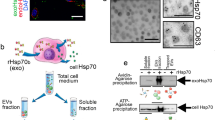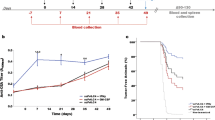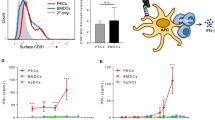Abstract
Heat shock proteins (hsps) chaperone cytosolic peptides, forming complexes that stimulate antitumor immunity. Hsps facilitate signal 1 in the two-signal model of T-cell costimulation, whereas cell adhesion molecules such as B7.1 provide secondary (signal 2) costimulatory signals. B7.1 gene transfer into tumors in situ has been shown to eradicate small (<0.3 cm in diameter) tumors in mice, and induce systemic antitumor immunity, but is ineffective against larger tumors. We examine whether mammalian hsps, as facilitators of T-cell costimulation, also exhibit this ability, and whether simultaneously stimulating both signal 1 (hsp-facilitated antigen presentation) and signal 2 (B7.1-mediated costimulation) enhances antitumor immunity compared to that achieved with either monotherapy. Prophylactic vaccination of mice with an hsp preparation from an EL-4 lymphoma weakly retarded tumor growth, to the same extent as that achieved with a single EL-4–derived peptide (AQHPNAELL), previously shown to induce antitumor immunity establishing that a preparation of EL-4 hsp–peptide complexes has antitumor activity. Here we show that injection of rat hsp70.1 into mouse tumors in situ causes the complete eradication of tumors, and generates potent systemic antitumor immunity mediated by CD4+ and CD8+ T cells. Unexpectedly, simultaneous gene transfer of hsp70.1 and B7.1 compromised the efficacy of hsp-mediated tumor rejection — a problem which could be partially overcome by the timed delivery of hsp70.1 and B7.1. Thus, gene transfer of hsp70 into tumors can be employed to generate potent systemic antitumor immunity, but further consideration is required if this approach is to be successfully combined with immunotherapies employing other T-cell costimulators. Cancer Gene Therapy (2001) 8, 974–981
This is a preview of subscription content, access via your institution
Access options
Subscribe to this journal
Receive 12 print issues and online access
$259.00 per year
only $21.58 per issue
Buy this article
- Purchase on Springer Link
- Instant access to full article PDF
Prices may be subject to local taxes which are calculated during checkout
Similar content being viewed by others
References
Craig EA . The heat shock response CRC Crit Rev Biochem 1985 18: 239–280
De Maio A . Heat shock proteins: Facts, thoughts, and dreams Shock 1999 11: 1–12
Cristau B, Schafer PH, Pierce SK . Heat shock enhances antigen processing and accelerates the formation of compact class II alpha beta dimers J Immunol 1994 152: 1546–1556
Suzue K, Zhou X, Eisen HN, et al . Heat shock fusion proteins as vehicles for antigen delivery into the major histocompatibility complex class I presentation pathway Proc Natl Acad Sci USA 1997 94: 13146–13151
Udono H, Srivastava PK . Heat shock protein 70–associated peptides elicit specific cancer immunity J Exp Med 1993 178: 1391–1396
Young RA, Elliot TJ . Stress proteins, infection and immune surveillance Cell 1989 59: 5–8
Jindal S . Heat shock proteins: Applications in health and disease Trends Biotechnol 1996 14: 17–20
Wells AD, Malkovsky M . Heat shock proteins, tumor immunogenicity and antigen presentation: An integrated view Immunol Today 2000 21: 129–132
Tamura Y, Peng P, Liu K, et al . Immunotherapy of tumors with autologous tumor-derived heat shock protein preparations Science 1997 278: 117–120
Blachere NE, Li Z, Chandawarkar RY, et al . Heat shock protein–peptide complexes, reconstituted in vitro, elicit peptide specific cytotoxic T lymphocyte response and tumor immunity J Exp Med 1997 186: 1315–1322
Castelli C, Ciupitu AMT, Rini F, et al . Human heat shock protein 70–peptide complexes specifically activate antimelanoma T cells Cancer Res 2001 61: 222–227
Asea A, Kraeft SK, Kurt-Jones EA, et al . HSP70 stimulates cytokine production through a CD14-dependant pathway, demonstrating its dual role as a chaperone and cytokine Nat Med 2000 6: 435–442
Janetzki S, Palla D, Rosenhauer V, Lochs H, Lewis JJ, Srivastava PK . Immunization of cancer patients with autologous cancer-derived heat shock protein gp96 preparations: A pilot study Int J Cancer 2000 88: 232–238
Wells AD, Rai SK, Salvato MS, et al . Hsp72-mediated augmentation of MHC class I surface expression and endogenous antigen presentation Int Immunol 1998 10: 609–617
Todryk S, Melcher AA, Hardwick N, et al . Heat shock protein 70 induced during tumor cell killing induces Th1 cytokines and targets immature dendritic cell precursors to enhance antigen uptake J Immunol 1999 163: 1398–1408
Chen CH, Wang TL, Hung CF, et al . Enhancement of DNA vaccine potency by linkage of antigen gene to an HSP70 gene Cancer Res 2000 60: 1035–1042
Lukacs KV, Nakakes A, Atkins CJ, et al . In vivo gene therapy of malignant tumors with heat shock protein-65 gene Gene Ther 1997 4: 346–350
Liu Y, Linsley PS . Costimulation of T cell growth Curr Opin Immunol 1992 4: 265–270
Van Seventer GA, Shimizu Y, Shaw S . Roles of multiple accessory molecules in T cell activation Curr Opin Immunol 1991 3: 294–303
Kanwar JR, Berg RW, Lehnert K, et al . Taking lessons from dendritic cells: Multiple xenogeneic ligands for leukocyte integrins have the potential to stimulate anti-tumor immunity Gene Ther 1999 6: 1835–1844
Peng P, Menoret A, Srivastava PK . Purification of immunogenic heat shock protein 70–peptide complexes by ADP affinity chromatography J Immunol Methods 1997 204: 13–21
Blake J, Johnston JV, Hellstrom KE, et al . Use of combinatorial peptide libraries to construct functional mimics of tumor epitopes recognized by MHC class I–restricted cytolytic T lymphocytes J Exp Med 1996 184: 121–130
Lisowska K, Krawczyk Z, Widlak W, et al . Cloning, nucleotide sequence and expression of rat heat inducible hsp70 gene Biochim Biophys Acta 1994 1219: 64–72
Chen L, Ashe S, Brady WA, et al . Costimulation of antitumor immunity by the B7 counterreceptor for the T lymphocyte molecules CD28 and CTLA-4 Cell 1992 71: 1093–1102
Graner M, Raymond A, Akporiaye E, Katsanis K . Tumor-derived multiple chaperone enrichment by free-solution isoelectric focusing yields potent antitumor vaccines Cancer Immunol Immunother 2000 49: 476–484
Rajdev S, Hara K, Kokubo Y, et al . Mice overexpressing rat heat shock protein 70 are protected against cerebral infarction Ann Neurol 2000 47: 782–791
Multhoff G, Botzler C, Jennen L, et al . Heat shock protein 72 on tumor cells: A recognition structure for natural killer cells J Immunol 1997 158: 4341–4350
Wilson JL, Charo J, Martin-Fontecha A, et al . NK cell triggering by the human costimulatory molecules CD80 and CD86 J Immunol 1999 163: 4207–4212
Yang J-P, Huang L . Direct gene transfer to mouse melanoma by intratumor injection of free DNA Gene Ther 1996 3: 542–548
Lenschow DJ, Walunas TL, Bluestone JA . CD28/B7 system of T cell costimulation Annu Rev Immunol 1996 14: 233–258
Acknowledgements
This work was supported in part by grants from the Royal Society of New Zealand, the Cancer Society of New Zealand, the Health Research Council of New Zealand, the Lottery Grants Board, and the Wellcome Trust (UK).
Author information
Authors and Affiliations
Corresponding author
Rights and permissions
About this article
Cite this article
Rafiee, M., Kanwar, J., Berg, R. et al. Induction of systemic antitumor immunity by gene transfer of mammalian heat shock protein 70.1 into tumors in situ. Cancer Gene Ther 8, 974–981 (2001). https://doi.org/10.1038/sj.cgt.7700395
Received:
Published:
Issue Date:
DOI: https://doi.org/10.1038/sj.cgt.7700395
Keywords
This article is cited by
-
Nitroreductase-based therapy of prostate cancer, enhanced by raising expression of heat shock protein 70, acts through increased anti-tumour immunity
Cancer Immunology, Immunotherapy (2006)
-
Antitumor immune responses mediated by adenoviral GDEPT using nitroreductase/CB1954 is enhanced by high-level coexpression of heat shock protein 70
Cancer Gene Therapy (2005)
-
Heat shock protein 70 gene therapy combined with hyperthermia using magnetic nanoparticles
Cancer Gene Therapy (2003)



